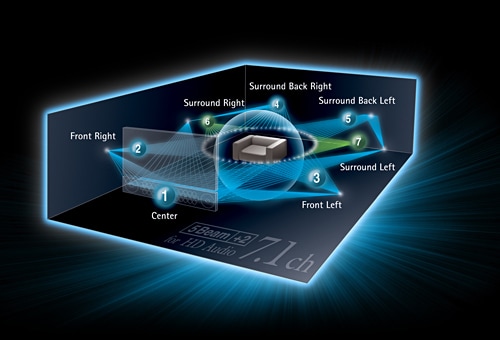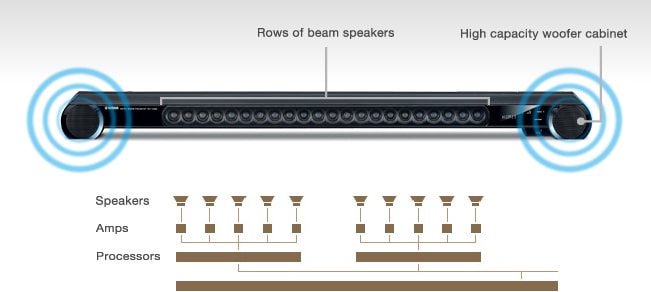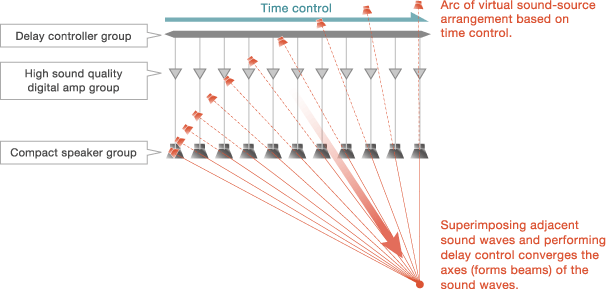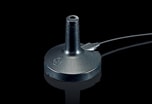YSP-4300 Снято с производства
Digital Sound Projectors use Yamaha’s proprietary technology to bounce sound focused into beams off walls, producing true multi-channel surround sound.

The primary advantage of the YSP Series is that simply placing a unit in the front of a room provides true surround sound, which you hear from the front and rear and also the left and right. Its key technologies are the production of sound beams via the control of multiple built-in speakers, and IntelliBeam, which automatically sets the optimum sound field for the size and shape of the room. Thanks to these two technologies, the YSP Series can reproduce 7.1-channel surround sound that is natural with an expansive feeling, qualities that cannot be achieved by virtual surround systems.
Beam control technology creates sound beams.
The front surface of a YSP unit features a number of compact beam speakers* installed in orderly rows. Control of each of these speakers on a time axis by individual amps creates five sound beams. Bouncing these sound beams off walls creates a surround environment.
* YSP-3300: 16; YSP-4300: 22

Superimposing sound waves from the compact speakers installed in a row and adjusting their direction by delay control causes the axes of the sound waves to converge in a specified direction.

How the sound beams are created.
- Sound produced from the speakers is transmitted radially from the sound source, like an expanding ripple (Fig. 1).
- The sound waves from two speakers are superimposed, creating interference (Fig. 2).
- If the number of speakers in adjoining locations is increased, the sound waves are superimposed even more, so the sound is transmitted as a single strong wave. This is a sound beam (Fig. 3).
- By using a processor (dedicated Yamaha LSI) to control the times when each speaker produces sound, the direction of the sound beams can be controlled (Fig. 4).
- Controlling the directions of the beams to bounce them off the walls enables the sound to come from five directions: front left and right, rear left and right, and centre. Models from the YSP-4300/3300 create two phantom sound sources in addition to the five beams, to provide 7.1-channel surround sound.
1. Sound from the speakers is transmitted radially.
2. Ripples of sound from two adjacent speakers are superimposed, creating interference.
3. The ripples of sound are further superimposed, creating a single strong wave — a sound beam.
4. The timing of the sounds from each speaker are delayed, controlling the direction of the beams.

IntelliBeam automatically sets the listening environment best suited to the room.

When the microphone is placed at the listening position, it searches for the places suitable for reflecting the beams while it checks the size and shape of the room and the quality of the wall material, in order to automatically adjust the beam angle, the volume and the sound quality. This makes it easy to achieve the best surround sound environment.

Presence created by true surround.

YSP models achieve real multi-channel surround by, not virtually but actually, bouncing sound beams off walls. This provides three major benefits.
1. Natural ambience
YSP models naturally expand the sound radiated onto the walls, producing surround sound without the unnatural feeling of sound linkages between the channels.
2. Wide listening area
YSP models provide ideal family listening, because the listening area is wider than with conventional virtual surround sound.
3. Less individual differences and listening fatigue.
Ordinary virtual surround systems often sound different to different people because the surround sound is created artificially. This causes some people to become tired of listening after a certain amount of time. With YSP models, sound bounced off walls actually comes from behind the listeners, which means there is little difference in its effect between individuals, and people are unlikely to experience listening fatigue, even after long periods.




